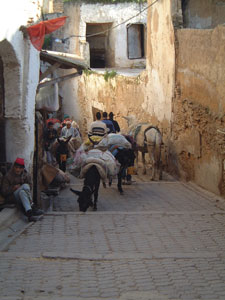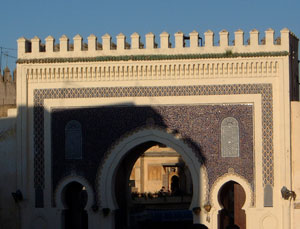 A
Day in the life of a Caravan merchant
A
Day in the life of a Caravan merchant
Walking
through Fes, one wonders at the hundreds or shops, boutiques and one-man
stalls that crowd the city's tiny alleys. Overcharged mules transport
endless goods up and down the cobblestoned hills, with little or no
regard for clueless wanderers like ourselves.
In
Leo's days, Fes was no different. It was then the main center of industry,
crafts and business in the Maghreb, and had been so since the XIIth
century. Reading his methodic description of the city's many crafts
(from book sellers and leather dyers, to copper melters and fruit merchants-
extending in co-centric circles from the Quaraouine mosque) one is not
surprised to learn that at its height, Fes regrouped some 150 different
professions. Travelers and traders of all places stopped here either
on their way to or back from the Sahara.
 Let's
follow a typical traveler, as he enters the medina through one of its
great doors, in search of a place to rest his tired body, and stock
up on goods for the road.
Let's
follow a typical traveler, as he enters the medina through one of its
great doors, in search of a place to rest his tired body, and stock
up on goods for the road.
Approaching
the city on horseback (dromedaries would only be rented once he reached
the Southern tips of Morocco), our traveler would have been one of many
amongst a convoy of merchants and pilgrims coming from one of the rich
coastal communities.
Bab
Boujeloud- the Boujeloud "door"
Loaded with European goods (textiles and beads), these merchants would
be eager to exchange them for Fassi leather and books, which garnered
high prices in the Sudan. They probably conducted these trades from
within a fondouk, or caravanserail: a hotel of sorts, for traveling
mechants.